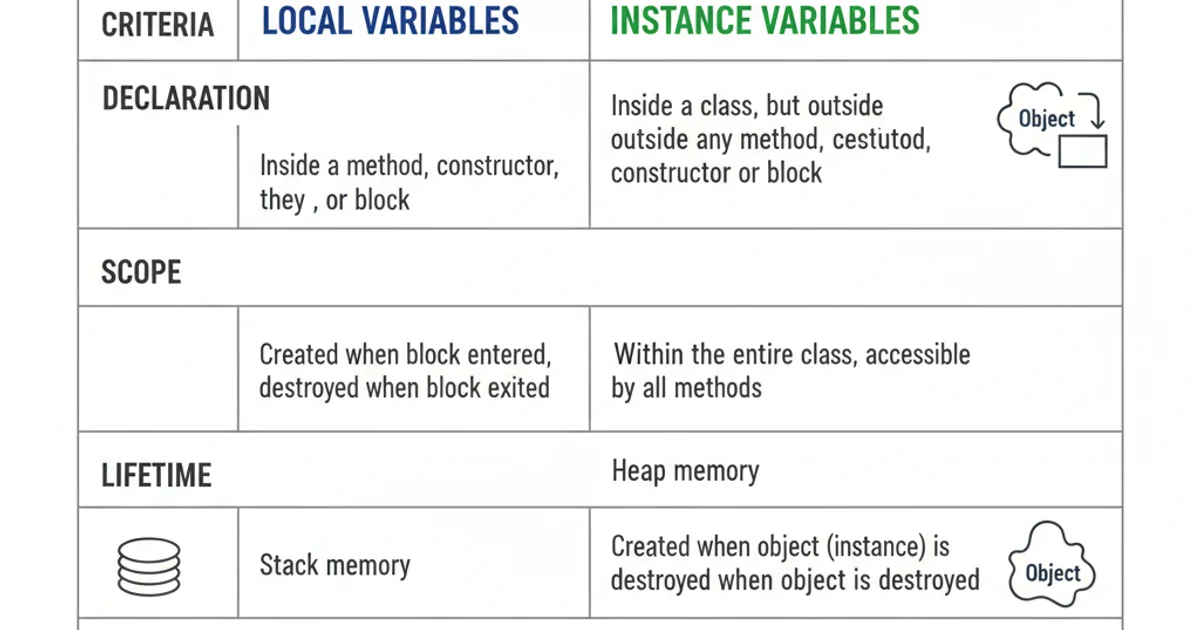What is the difference between local and instance variables in Java?
Categories:
Java Variables: Local vs. Instance Explained

Understand the fundamental differences between local and instance variables in Java, including their scope, lifetime, memory allocation, and best use cases.
In Java, variables are essential for storing data. However, not all variables behave the same way. Their scope, lifetime, and how they are stored in memory depend on where they are declared. This article will demystify the distinctions between two primary types of variables: local variables and instance variables, providing clear explanations and practical examples.
What are Instance Variables?
Instance variables (also known as non-static fields) are variables declared inside a class but outside any method, constructor, or block. They belong to an object (an instance of a class) and are created when an object is instantiated using the new keyword. Each object of the class will have its own copy of these variables, and changes to an instance variable in one object do not affect the same variable in another object.
public class Car {
// Instance variables
String model;
int year;
double speed;
public Car(String model, int year) {
this.model = model;
this.year = year;
this.speed = 0.0; // Default value
}
public void accelerate(double increment) {
this.speed += increment;
}
public void displayInfo() {
System.out.println("Model: " + model + ", Year: " + year + ", Speed: " + speed);
}
}
public class Main {
public static void main(String[] args) {
Car myCar = new Car("Toyota Camry", 2020);
Car yourCar = new Car("Honda Civic", 2022);
myCar.accelerate(50.0);
yourCar.accelerate(30.0);
myCar.displayInfo(); // Output: Model: Toyota Camry, Year: 2020, Speed: 50.0
yourCar.displayInfo(); // Output: Model: Honda Civic, Year: 2022, Speed: 30.0
}
}
Example of instance variables in a Java class.
false for boolean, null for object references) if not explicitly initialized.What are Local Variables?
Local variables are variables declared inside a method, constructor, or block. They are temporary and exist only within the scope of the block in which they are declared. Once the method or block finishes execution, the local variables are destroyed. They are stored on the stack and must be explicitly initialized before use; Java does not provide default values for local variables.
public class Calculator {
public int add(int a, int b) {
// 'result' is a local variable
int result = a + b;
// 'message' is also a local variable
String message = "Addition performed.";
System.out.println(message);
return result;
}
public void printNumbers() {
for (int i = 0; i < 5; i++) {
// 'i' is a local variable specific to this loop block
System.out.println(i);
}
// System.out.println(i); // This would cause a compile-time error: 'i cannot be resolved to a variable'
}
public static void main(String[] args) {
Calculator calc = new Calculator();
int sum = calc.add(10, 20);
System.out.println("Sum: " + sum);
calc.printNumbers();
}
}
Example of local variables within methods and blocks.
Key Differences Summarized
The table below provides a concise comparison of local and instance variables, highlighting their primary distinctions.
classDiagram
class ClassA {
- instanceVar: String
+ methodA(param: int)
}
ClassA --> "1" ObjectA
ClassA --> "1" ObjectB
ObjectA : +instanceVar = "Value1"
ObjectB : +instanceVar = "Value2"
methodA --|> localVariable
class localVariable {
- localParam: int
- tempVar: boolean
}
note for ClassA "Instance variables belong to objects."
note for localVariable "Local variables belong to methods/blocks."Class diagram illustrating the relationship between classes, objects, instance variables, and local variables.

Comparison of Local vs. Instance Variables
Understanding these differences is crucial for writing correct, efficient, and maintainable Java code. Misusing variable types can lead to unexpected behavior, memory leaks, or difficult-to-debug errors. Always choose the variable type that best fits the data's scope and lifetime requirements.